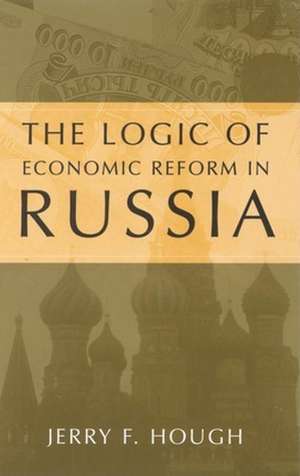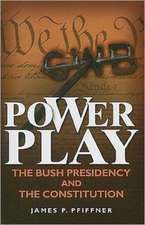The Logic of Economic Reform in Russia
Autor Jerry F. Houghen Limba Engleză Paperback – apr 2001
This book examines the failure of economic reform in Russia since 1991, when Boris Yeltsin proclaimed his commitment to economic stabilization, privatization, and price liberalization. Optimism over Russia¡¯s market reforms vanished with the crash of August 1998, when the ruble lost over 70 percent of its value and banks defaulted on their debts and forward currency contracts. Contrary to Yeltsin¡¯s reform promises, the Russian economy of the 1990s more closely resembled a Soviet model than a market-driven one. The Logic of Economic Reform in Russia illuminates the general problems of establishing market economies in settings where the institutional system to support the market has not had decades to develop. Suggesting that corruption may be associated with growth in the early stages of capitalism, Jerry F. Hough argues that the disappointing results of Yeltsin¡¯s reform efforts were not the product of Russian culture or history, but the logical consequences of rational men responding to the incentive system created by economic reform.
Preț: 232.66 lei
Nou
Puncte Express: 349
Preț estimativ în valută:
44.52€ • 46.64$ • 36.90£
44.52€ • 46.64$ • 36.90£
Carte tipărită la comandă
Livrare economică 09-23 aprilie
Preluare comenzi: 021 569.72.76
Specificații
ISBN-13: 9780815737537
ISBN-10: 081573753X
Pagini: 318
Dimensiuni: 152 x 229 x 23 mm
Greutate: 0.44 kg
Ediția:New.
Editura: Brookings Institution Press
Colecția Brookings Institution Press
ISBN-10: 081573753X
Pagini: 318
Dimensiuni: 152 x 229 x 23 mm
Greutate: 0.44 kg
Ediția:New.
Editura: Brookings Institution Press
Colecția Brookings Institution Press
Notă biografică
By Jerry F. Hough
Descriere
This book examines the failure of economic reform in Russia since 1991, when Boris Yeltsin proclaimed his commitment to economic stabilization, privatization, and price liberalization. Optimism over Russia¡¯s market reforms vanished with the crash of August 1998, when the ruble lost over 70 percent of its value and banks defaulted on their debts and forward currency contracts. Contrary to Yeltsin¡¯s reform promises, the Russian economy of the 1990s more closely resembled a Soviet model than a market-driven one. The Logic of Economic Reform in Russia illuminates the general problems of establishing market economies in settings where the institutional system to support the market has not had decades to develop. Suggesting that corruption may be associated with growth in the early stages of capitalism, Jerry F. Hough argues that the disappointing results of Yeltsin¡¯s reform efforts were not the product of Russian culture or history, but the logical consequences of rational men responding to the incentive system created by economic reform.












